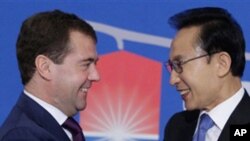On Russia's coat of arms, the double-headed eagle looks west and east. Russia's president is now in South Korea, promoting energy sales to Korea and Korean investment in Russia.
Russia's President Dmitry Medvedev is promoting a 40-year deal to sell gas to South Korea, and appealing for Korean industrial investment to help diversify Russia's economy.
Russia's leader said in Seoul his country is interested in the arrival of Korean investors. He says they bring in modern technologies and introduce a modern culture of production.
Looking for bricks and mortar investments from Asia, Russians like to cite South Korea's Lotte group, which opened a 300-room luxury hotel in September in downtown Moscow.
At the same time, Hyundai opened a $500-million auto assembly plant in St. Petersburg. Supplied by Korean auto parts plants set up nearby, the Hyundai plant has the highest percentage of locally produced content of any foreign carmaker in Russia.
With Samsung and LG, employing hundreds of Russian scientists at their research centers in Russia, President Medvedev called for more such 'modernization alliances'. In Seoul this week, Russians are in talks with Korean companies to build ships, electric transformers, and offshore oil drilling platforms in Vladivostok, Russia's major port on the Pacific.
Russian expert on Korean affairs Leonid Petrov now teaches at the University of Sydney.
''Regrettably, the eastern part of Russia is still under developed and under-populated," Petrov explains, "and Russia is trying to look at Korea as a potential developer and investor, and competitor to the Chinese developers and investor."
In the gas deal under negotiation, potentially worth $100-billion, the Korean Gas Corporation would also build a liquefied natural gas plant in Vladivostok.
The chief operating officer of Gazprom, Russia's state-controlled gas producer, Alexei Miller, tells reporters in Seoul that Russia sees a big future in gas exports to Asia.
While Europe remains Gazprom's top priority, he said, the volume of Russian gas deliveries to the Asian market could reach the level of gas exports to Europe within a very short period time.
Last year, South Korea started importing Russian oil through a new Siberian pipeline and Russian liquefied natural gas from Sakhalin Island. With Russia-Korea trade jumping in the past decade, diplomats from both countries are negotiating a visa-free visitor plan.
Not all is roses with Korea.
Last spring, South Korea's embassy in Moscow appealed to Russian authorities to protect the 2,000 South Korean students in Russia. In two attacks blamed on skinheads, one Korean student was killed and another was injured.
At the same time, North Korea blocks construction of gas and rail lines that would link South Korea's booming economy with the riches of Russia's Siberia. For the past two decades, Professor Petrov has watched as Russia and South Korea failed to overcome North Korean opposition to such transit links.
"The main problem in this region is the black hole of North Korea which is on the way between Russia, China and South Korea. And you cannot do much about it because you have to decide whether the pipe is going to go through the North Korean territory and then Pyongyanag is going to hijack and shipment any transit of oil and gas or electricity from Russia or China to South Korea and it becomes unpredictable," Petrov said.
Russia's president touched on the potential instability of North Korea. Before arriving in Seoul, he told a South Korean newspaper he is "uneasy" that North Korea's nuclear-bomb testing range is slightly more than 100 kilometers from Vladivostok.
Russia Seeks Investment And Trade In South Korea
- By James Brooke




